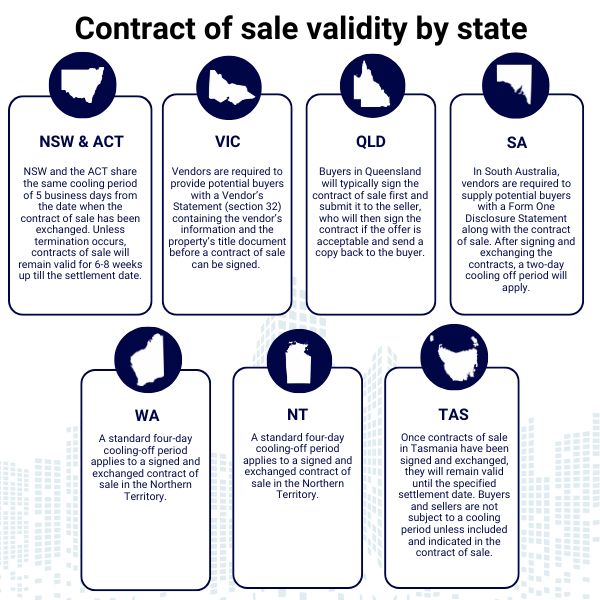The contract of sale is a critical document that binds both buyers and vendors into a legal agreement based on certain conditions of sale.
But how long does the contract of sale stay valid for, and how are buyers and sellers bound by the terms of the contract? This guide provides an overview of the validity of the contract of sale for property transactions in Australia.
What is the contract of sale?
A contract of sale is a legal document that outlines the specific conditions of a property transaction between two parties — a buyer and a seller.
It will include details such as the sale price, the description of the property, a list of inclusions and exclusions for the sale, the settlement date, and other special conditions based on the agreement of both buying and selling parties.
How long does the contract of sale stay valid for?
Unless otherwise stated in the agreement, the contract of sale will stay valid up to the point when settlement is completed i.e. on the day of settlement listed on the contract.
Each contract of sale will have a selected settlement date that has been agreed upon by both parties which typically ranges between 30-90 days from the date of exchange of contracts.
The validity of a contract of sale may also be represented by a sunset clause, which indicates a date by which parties must be ready to complete settlement. This sets a clear timeline for buyers and vendors to prepare their respective deliverables, helping to avoid necessary delays in the transaction.
It is also possible for the contract of sale to be terminated before the settlement can be completed — upon termination, the contract of sale will no longer be valid.
Buyers can terminate the contract during what is known as the “cooling-off period” without being held liable for exiting the contract (but may still have to pay a penalty fee based on the purchase price).
This cooling-off period differs between states and territories in Australia and starts from the exchange of contracts between parties. Property transactions that take place via an auction will not have a cooling period.
When does the contract of sale become valid?
The contract of sale only becomes valid and legally binding when it is signed by both the buyer and the seller and exchanged between the parties.
By signing and exchanging the contract of sale, buyers and sellers are agreeing to all of the listed conditions of the sale within the contract and will be held responsible for fulfilling their end of the agreement. Each party will usually engage a property solicitor or conveyancer to review it and provide a clear understanding of the terms of the sale before signing it.
Once the contract of sale is signed, it is then exchanged either via mail or an in-person meeting. From this point, the contract of sale is considered to be legally binding for both the vendor and the purchaser.
Contract of sale validity by state
New South Wales & Australian Capital Territory
NSW and the ACT share the same cooling period of 5 business days from the date when the contract of sale has been exchanged. Unless termination occurs, contracts of sale will remain valid for 6-8 weeks up till the settlement date.
Victoria
In Victoria, vendors are required to provide potential buyers with a Vendor’s Statement (section 32) containing the vendor’s information and the property’s title document before a contract of sale can be signed. Property transactions in Victoria have a cooling period of 3 business days after the exchange of contracts.
Queensland
Buyers in Queensland will typically sign the contract of sale first and submit it to the seller, who will then sign the contract if the offer is acceptable and send a copy back to the buyer. From that point on, a cooling-off period of 5 days will apply. Contracts of sale will remain valid for 30-90 days after acceptance, up to the date of settlement.
South Australia
In South Australia, vendors are required to supply potential buyers with a Form One Disclosure Statement along with the contract of sale. After signing and exchanging the contracts, a two-day cooling off period will apply.
Western Australia
There is no mandated cooling-off period for property sales in Western Australia. A contract of sale can be amended to include a cooling-off period based on the agreement of both buying and selling parties.
Northern Territory
A standard four-day cooling-off period applies to a signed and exchanged contract of sale in the Northern Territory.
Tasmania
Once contracts of sale in Tasmania have been signed and exchanged, they will remain valid until the specified settlement date. Buyers and sellers are not subject to a cooling period unless included and indicated in the contract of sale.
Can the validity of a contract of sale be extended?
The validity period of a contract of sale can be extended by postponing the date of settlement — this is usually done to allow the buyer of the seller more time to meet the necessary conditions outlined in the contract of sale.
Extension of this period will require mutual agreement from both parties. If either party does not agree to the extension, there is a risk that the contract will not be correctly fulfilled for settlement, which may lead to a cancellation of the contract of sale.
Common reasons for requesting an extension of time include:
- For buyers to obtain financial approval from lenders in order to make payment for the sale price.
- For vendors to carry out and complete the necessary repair or preparatory work to get the property in an acceptable state for settlement.
- To carry out building and pest inspections on the property.
Entry Education provides expert conveyancing services in Melbourne, Sydney, and Brisbane for buyers and sellers to obtain clear legal guidance for a smooth and favourable property transaction. We can accurately review the contract of sale for your prospective property sale or purchase to ensure that it meets all of the necessary legal requirements.






